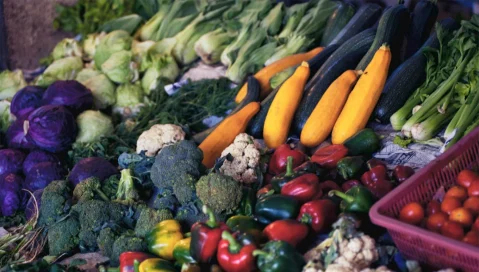Top Improvement Initiatives for Food Manufacturers in 2021
Top Improvement Initiatives for Food Manufacturers in 2021
Top Improvement Initiatives for Food Manufacturers in 2021
8 Dec 2020
Aptean Staff Writer
The last few months of any year are when predictions of the industry trends for the following year begin to emerge. But as the time comes to take stock of 2020, food manufacturers can reflect on one of the most unpredictable years in history. The Covid-19 pandemic has been the defining event of the year (and perhaps the era), and its impact will continue to be felt long into 2021.
But there is so much more that the food industry can learn from this year in order to make gains next year. Coronavirus may still be top of the news agenda, but it doesn’t have a monopoly on the forces shaping consumer demand, changing the world of food and informing the next steps for food businesses. Here are the top improvement initiatives all food businesses should be looking at in 2021.
Prepare Better for Unusual Demand Patterns
If there’s one thing the pandemic has taught us so far it’s the value of being agile as a food business. Those that were able to scale production up or down at the right time and to the correct degree had a big efficiency advantage.
There will continue to be a need for this; as we all get back to normal, demand will fluctuate and follow patterns which may seem unpredictable to the naked eye. This is especially important when it comes to food wastage - a significant problem for the industry at the best of times but one it’s even more vulnerable to at the moment.
Advanced forecasting methods and analytics tools will be more important than ever for demand planning, efficiency and minimising waste in 2021.
Start Taking Sustainability Seriously
In their recent report into trends shaping the food industry, global nutrition leaders ADM found 65% of customers actively want to have a positive effect on the environment through everyday activities. Being able to offer products that fit this brief should be a priority for all food manufacturers. Businesses can respond in a number of ways, for instance:
Agriculture - Regenerative agriculture will help enrich soil in the long-term
Packaging - Using renewable materials, or sometimes no materials at all, can negate the need for plastic
Supply chain - Sourcing ingredients more locally will lower their carbon footprint (and increase quality)
But there are so many other reasons why sustainable practices are needed right now. They will be crucial in the fight against climate change and world hunger and help give everyone in the global food industry an equitable stake. When it comes to making supply chains shorter and more local, the pandemic showed how this can benefit food manufacturers - and will do so again - the event of global shocks.
Embrace Flexibility
In 2020, food businesses were forced to completely upend their production schedules to cater to different sectors - often for the first time and at very short notice. While this was necessary for many to maintain some sort of trade when things were at their bleakest, it showed us the potential of many businesses to exploit new revenue streams quickly. Manufacturers are unlikely to want to pivot almost entirely from foodservice to retail or direct-to-consumer (as many were forced to) again, but the ability to capture a new market share when the opportunity presents itself is something all could benefit from.
Consider Expanding Your Plant-Based Product Ranges
The most striking change taking place in food demand right now is one towards plant-based alternatives. Nestle have reported that 87% of people in the US now include plant-based proteins in their diet. Driven by a range of factors including concern for the environment, animal welfare and personal health, consumers will increasingly be looking to the prepared food industry especially for new plant-based lines. Advanced solutions like food-specific ERP are built to manage the introduction of new products and the costing, quality control and inventory management concerns that come with them.
Workplace Safety
With much of the world - especially North America and Europe - back in lockdown, the danger of Covid-19 outbreaks on food manufacturing sites grows again. By and large, manufacturers were able to prepare factory floors in the Spring through rapid implementation of safety measures. Now is a good time to reinforce safety through physical distancing, improved sanitation and altered production schedules. Technology like manufacturing execution systems (MES) can aid in tracking and protecting employee health to ensure businesses maintain their duty of care and can remain open and producing.
The Future
In spite of the difficulties of 2020, food manufacturers are looking to 2021 with optimism. But for businesses to get beyond the recovery phase and start thriving, they must keep looking for new advantages - the five initiatives we’ve discussed here are just a few of the options available. Aptean’s Global Food & Beverage Industry Trends Report offers further insight into the state of digital transformation in the food sector and what we’re likely to see in the coming years.
When looking to transform a food business for the better, food-specific ERP can help by making systems more integrated, giving better insight from a wealth of data and extending the core features of new technology to all users.
Wilt u weten wat we voor uw voedingsbedrijf kunnen betekenen?
Wij helpen u graag. Neem contact met ons op en ontdek welke smaken we te bieden hebben.



